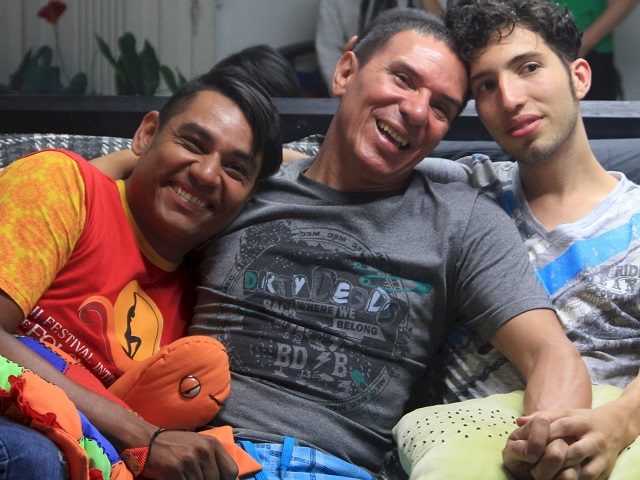Colombia has become the first country to legally recognize the union of three gay men, where Manuel Bermúdez, Alejandro Rodríguez and Víctor Hugo Prada have united in a “special three-way patrimonial regime” in the city of Medellín.
Although the arrangement is being billed by local media as a “three-way gay marriage,” legally it is closer to a civil union. In 2016, Colombia legalized same-sex marriage, but for the moment it still officially limits the number of partners to two.
“This union is very different from a marriage, since the very constitution of the contract is very different, and represents only a declaration of the will of the parties,” according to the notary office that formalized the union. The men describe their partnership as a “trieja,” a made-up Spanish word distinct from the word for couple (“pareja”).
The brief signing ceremony took place at the Medellín notary office in June, but the three men are planning a larger public ceremony to happen in the next few months.
“We want to make what’s intimate, public,” said 23-year-old Prada, the youngest of the three. “We have no reason to hide it. We are just helping people realize that there are different types of love and different types of family.”
For his part, Manuel Bermúdez demurred when asked how old he was, noting that “you never ask the age of a woman or a fag,” though it is supposed that he is in his forties.
A similar affair was formalized on Valentine’s Day 2015, when three Thai men entered into a polygamous gay marriage, though it was sanctioned not by the state but under Buddhist law. On that day, Joke, 29, Bell, 21 and Art, 26 were married in the Uthai Thani Province. While Buddhism recommends that men take no more than one spouse, neither polygamy nor homosexual practice is strictly prohibited.
In Colombia, Prada told local media that the threesome’s new union constitutes a “polyamorous family.”
“What prompted me first to do this was the initial proposal of marriage that I made in a theater in 2012,” Prada said, who joined the marriage already formed between Bermúdez and Rodriguez in 2000, when they were constituted as a “legal partner.”
Originally this polyamorous relationship included a fourth partner, Alex Esneider Zabala, but he died of stomach cancer in 2012. In that instance, Zabala’s mother claimed inheritance rights to the young man’s property, but Colombian courts awarded the inheritance to the three remaining partners in the relationship.
The victorious lawyer who defended the three men was Germán Rincón Perfetti, an LGBT activist in Colombia. Rincón has expressed his satisfaction with the partners’ new legal relationship, saying it constitutes “a recognition of the existence of other types of families.”
When the U.S. Supreme Court made same-sex marriage legal in all fifty states in 2015, a number of media outlets tried to calm fears of a slippery slope by saying that polygamy would not follow.
Politico, for example, published a piece titled “No, Polygamy Isn’t the Next Gay Marriage,” in which it argued that removing the man-woman requirement for marriage wouldn’t lead to legalizing other marital arrangements that people might find appealing.
Unlike gay marriage, it stated, polygamy is “not good for women,” because it “places them in competition with other wives.” And while same-sex marriage stabilizes society, polygamy destabilizes it, the article contended.
A similar piece in Time magazine bore the title “Polygamy Is Not Next,” in which Cathy Young argued on practical grounds that polygamy would be much more complicated to legislate than gay marriage, since “the entire existing structure of modern marriage is designed for a dyad.”
Unlike the relatively simple substitution of “Spouse 1” and “Spouse 2” for “husband” and “wife,” she states, multi-partner marriage would require a “massive overhaul,” which would include “revising the rules on post-divorce property division or survivor benefits for three, five, or 10 people instead of two.”
Yet despite their protests, those wishing to disassociate same-sex marriage from polygamy ran up against some stern competition in the marketplace of ideas and sound reasoning.
In his dissent in Obergefell v. Hodges, however, Chief Justice John Roberts said that the majority “offers no reason at all why the two-person element of the core definition of marriage may be preserved while the man-woman element may not,” suggesting that no rationale against polygamy could exist once marriage has been made a fluid concept divorced from nature.
Limiting partners to two seems completely arbitrary, he went on, once the complementarity of the sexes has been eliminated as a valid consideration.
“If not having the opportunity to marry ‘serves to disrespect and subordinate’ gay and lesbian couples,” Roberts asked, “why wouldn’t the same ‘imposition of this disability’ serve to disrespect and subordinate people who find fulfillment in polyamorous relationships?”
Manuel, Alejandro and Víctor Hugo would undoubtedly agree.
Follow Thomas D. Williams on Twitter Follow @tdwilliamsrome

COMMENTS
Please let us know if you're having issues with commenting.